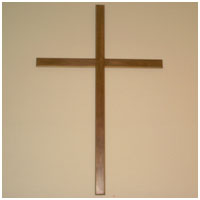 I am starting this journey with a song in my heart, Isaac Watts’ When I Survey the Wondrous Cross. The words help me focus on the reason for my journey and remind me how much my Lord gave for me. They inspire me to commit not only a brief moment of time to a short journey during this study, but to commit my soul, my life, my all to my God for the rest of my days. Read them slowly and consider them line by line.
I am starting this journey with a song in my heart, Isaac Watts’ When I Survey the Wondrous Cross. The words help me focus on the reason for my journey and remind me how much my Lord gave for me. They inspire me to commit not only a brief moment of time to a short journey during this study, but to commit my soul, my life, my all to my God for the rest of my days. Read them slowly and consider them line by line.
1. When I survey the wondrous cross
on which the Prince of Glory died;
my richest gain I count but loss,
and pour contempt on all my pride.
2. Forbid it, Lord, that I should boast,
save in the death of Christ, my God;
all the vain things that charm me most,
I sacrifice them to his blood.
3. See, from his head, his hands, his feet,
sorrow and love flow mingled down.
Did e’er such love and sorrow meet,
or thorns compose so rich a crown.
4. Were the whole realm of nature mine,
that were an offering far too small;
love so amazing, so divine,
demands my soul, my life, my all.
From the time I was a child I have always loved this hymn. I first sang it to the tune Hamburg, but over the years I have sung it using a variety of melodies.
It was common practice in Watts’ day to use familiar melodies for singing hymns in worship. Indeed, hymn books were often printed without music, while tune books were printed without words. The key for the worship leader was to select hymns and tunes so that the words and melodies matched.
When I Survey the Wondrous Cross is set in “long meter,” a form of verse containing four lines with eight syllables in each line. Any tune with a matching cadence can be used. Rockingham is often used. Old 100th, a familiar tune used with the Doxology, also fits. When the words fit the music, they support each other. As a result, the congregation sings together to learn and proclaim a common message.
On the journey to the foot of the cross there is only one message–the glory of Christ, crucified and risen. My song and my words must match. As I walk, I will take my steps to the meter of His mercy. I will tune my words to the language of His love. Will you?
Follow the Path!
CARadke
[Use with Introduction of A Labyrinth Pilgrimage]
